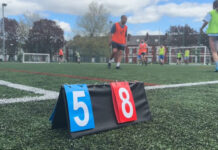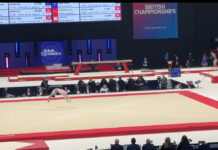Since the 2012 London Olympics, British Gymnastics has been on the rise and is contending for medals at the most important competitions.
This year’s World Championships, British gymnasts brought home a total of four medals, two of them gold. The most surprising of them all, the gold medal on the parallel bars by James Hall; beating the Chinese on the top event.
Before London all that was heard was possibly Beth Tweddle contending for medals on the uneven bars. What is behind Britain’s success? How do they operate?
There are two types of systems in the artistic gymnastics world. The first one being a fully centralized system, where gymnasts train and live, as there is in Russia. The other is a semi-centralized system, which is when each gymnast train at their own gyms, but get together once every month at the national team training center. This is how both the United States and Great Britain operate.
According to a study done by BBC Radio Five, gymnastics has seen an increase of the number of participants of about 25% after the London Olympics. Since then, British gymnasts have been contending for the sports top honors.
However, gymnastics is as beautiful as it seems. It is one of the most expensive sports, where gymnasts, who wish to take the elite path and go all the way to the Olympic games, have to dedicate at least ten years of their lives.
Each gym operates differently, but the monthly charge of being part of the competition team ranges from £150-£300. This excludes a yearly fee that every gymnast needs to pay to British Gymnastics. For gymnasts at this level it is £43. On top of this there also is the costs of travelling, competition fees or potential therapy to help the body recover from the tough workouts. Gymnasts, who choose the elite route, are mostly home-schooled, in order to be able to correlate their studies with all the hours of training.
Unlike professional football players, gymnasts do not receive money for taking part in regional or national competitions. Gymnasts only start to make some money if they can make a name for themselves in the elite world and make the national team. Once in the national team, gymnasts are selected to compete abroad and have better chances of making the World or Olympic teams. Only at this level do gymnasts start to gain some money, but only a handful make it.
Even though gymnasts make some money when they reach the sport’s top competitions, some gymnasts choose to go professional and take part in sponsorship deals. This helps them make more money, but to get there, one needs to be the best.
For example, Simone Biles has made about $2 million in sponsors, according to an article by CNBC. This excludes the money gained from all the medals she has.
Max Whitlock, Britain’s most successful gymnast in history does not even make anything similar to what Biles does.
Merseyside gymnast and Olympic medalist, Beth Tweddle said in an interview to the Telegraph that “Olympians earn less than you think”, emphasizing the point that the secret to make money in the gymnastics world is in sponsorship deals.
So, where does all the money go that is invested every year, by multiple parents?
The fee that every gymnast, coach, and judge pay to British Gymnastics each year, goes towards hosting national or even international competitions.
For example, Liverpool hosts the Artistic Gymnastics National Championships since 2016. Apart from this, Britain has hosted and still hosts some international competitions from the International Gymnastics Federation (FIG). In 2015, Glasgow hosted the World Championships, and in 2018 the European Championships. Birmingham hosts a World Cup every year.
In 2022, Liverpool is going to host the Artistic Gymnastics World Championships, which is being organized by both the Liverpool City Council and British Gymnastics.
Locally, Liverpool was once known as the “city of gymnastics”, according to the City of Liverpool Gymnastics Club.
Smaller clubs tend to spend money in improving their facilities. As City of Liverpool Gymnastics Club said: “In 1985, the gym became the first centralized training facility that offered full-time training, as well as accommodation. We had every male gymnast from the country training here.”
“There was such interest that we had to build an extension to support everyone,” they added.
With Liverpool finally hosting a major international gymnastics competition, most of the money made from British Gymnastics will certainly go towards making the event a big success.
Picture: Two Wings (Creative Commons Licence)

















